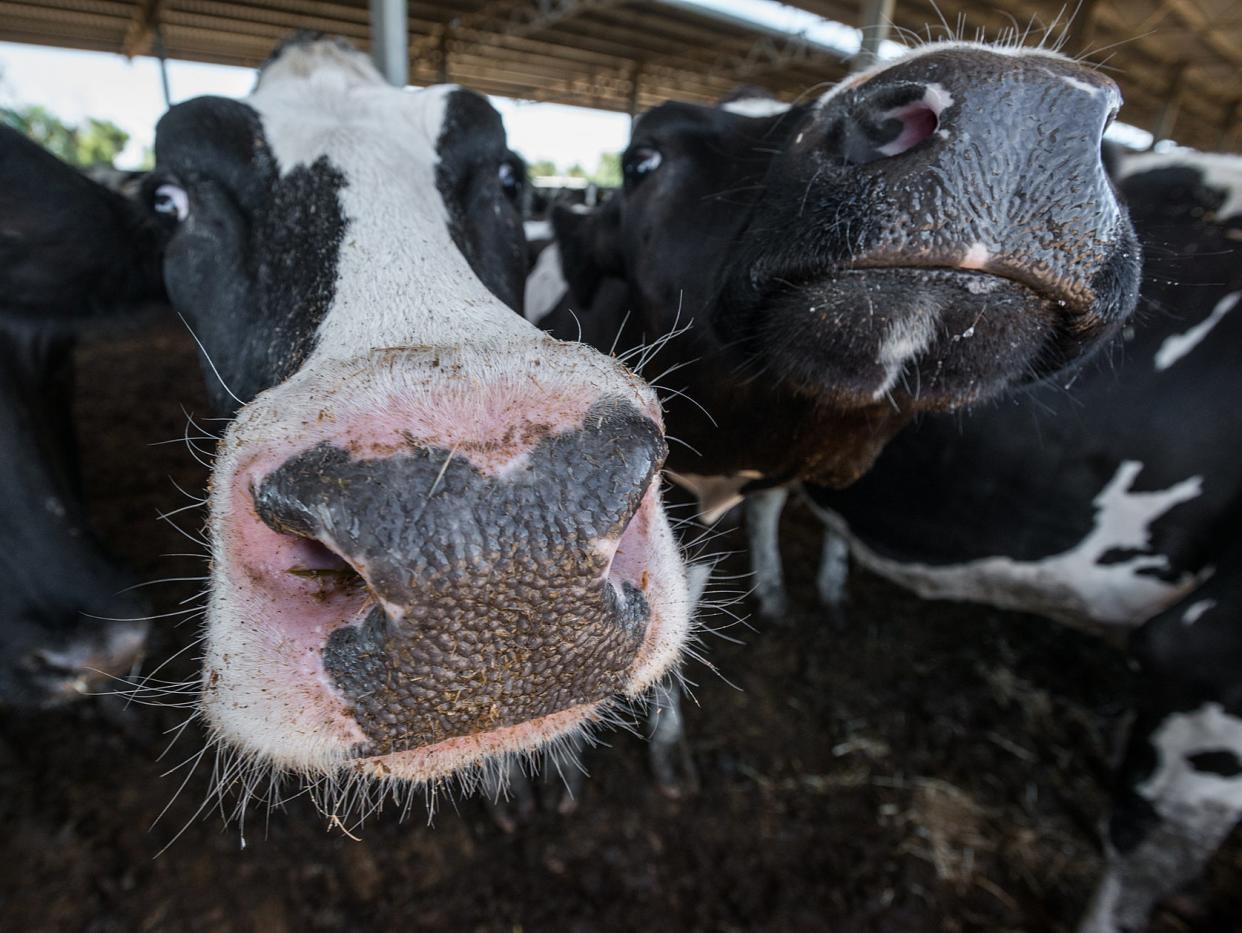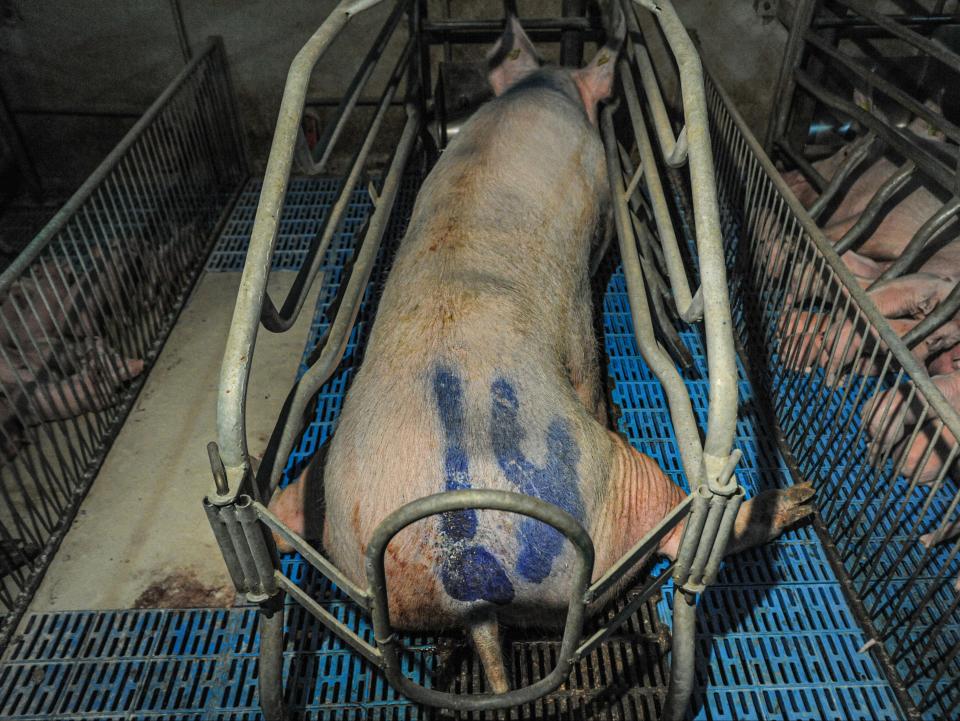UK-Australia trade deal could mean children and patients eating meat reared in ways illegal in UK, warn experts

Schoolchildren and hospital patients could be fed meat from hormone-fed cattle, chlorine-washed chicken and pigs kept in cruel stalls that are illegal in the UK under a trade deal with Australia, experts are warning.
Farmers and environmentalists say allowing imports that create high greenhouse gas emissions and undermine animal welfare would be grossly hypocritical of the government.
The UK and Australia have agreed “the vast majority” of a post-Brexit free trade deal, aiming to seal a deal by next month. Ministers hope a deal would help the economy to surge ahead as it recovers from the pandemic.
But a clause in government buying guidelines allows public-sector bodies to use imported food that would be illegal to produce in the UK if they can justify doing so on cost grounds.
MPs on the Commons food and rural affairs committee have called for the closure of the loophole for hospitals, schools, prisons and government departments, warning that ministers should “lead by example” on food standards.
The government points out that importing hormone beef or chlorinated chicken would be illegal, and trade secretary Liz Truss, who has been negotiating with Australia, has promised not to lower food import standards.
Additionally, the Conservative manifesto states: “In all of our trade negotiations, we will not compromise on our high environmental protection, animal welfare and food standards.”
However, fears have arisen that the combination of the buying loophole, together with Australian pressure for a deal, could mean people in institutions being served cheaper products that undercut UK production standards and cause more eco damage.
It includes meat from pigs kept in confined sow stalls that are banned in the UK and from cattle treated with growth hormones that are banned in the EU; wool from sheep that have had their back ends painfully cut, and powdered eggs from battery-caged hens, outlawed in Britain since 2012.
Farmers in Australia and the US use artificial hormones to fatten cattle more quickly although there are suspicions that at least one of them is carcinogenic.
And chicken carcasses are often washed with chlorine to kill bacteria that have infected the birds, according to evidence from Compassion in World Farming submitted to the government.
Campaigners say the step would also undermine Britain’s farmers and be bad for human and animal health.
The warnings echo those given over chlorinated chicken and hormone beef from the US under a trade deal.
Rob Percival, of the Soil Association, said: “It would be grossly hypocritical for the UK government to allow unsustainable meat to be served in schools and hospitals.
“As the hosts of Cop26, the UK should be leading by example, prioritising the purchase of low-carbon and higher welfare foods. This means buying British, and serving less and better meat.”
He called for the loophole to be closed urgently to avoid exporting carbon emissions and “betraying” British citizens and farmers.
David Bowles, the RSPCA’s head of public affairs, told The Independent more of Australia’s farm animals were farmed intensively than the UK’s, with only 7 per cent of hens free-range, against 55 per cent in Britain.
Merino wool sheep are subjected to “mulesing”, where folds of skin and flesh are cut off without anaesthetic to prevent flystrike, a practice illegal in the UK, he said.
And a recent Australian government-commissioned report last month found “big problems” with humaneness of slaughter in abattoirs that would fail British standards.
“I’d also say their standard of farming is not as good as here. Standards are poorer and standards of care are poorer,” he said. And he warned the government not to break its promise on animal welfare.

Martin Lines, UK chairman of the Nature Friendly Farming Network said: “Farmers across the UK have been working tirelessly to raise their concerns about the threat of being undercut by low-standard imported products, and these concerns about potential imports of low-environmental standards, high-carbon Australian meat are exactly what we were afraid of.”
Kate Norgrove, of WWF said: “It’s vital that any new trade deal the UK government signs up to ensures that all food sold in the UK, including that served in hospitals and schools, is produced in ways that protect people’s health and the environment.”
Australia is the only developed country on the list of the world’s largest 24 deforestation hot spots, she said.
Ms Truss told the BBC’s Andrew Marr last month: “I can absolutely promise that we’re not going to lower our excellent food standards to do this trade deal.”
In their report, the MPs said they were “surprised and disappointed” the government buying standards had not been used to improve animal welfare, sustainability and support for domestic producers.
They wrote: “As well as sending the wrong message about the importance of such standards, it is inappropriate for the government to advocate high food production standards for imports in future trade deals when any part of our public sector is exempt. The loophole, even if rarely used, must be closed.”
A government spokesperson said: “This government has been clear that in all of our trade negotiations we will not compromise on our high environmental protection, animal-welfare and food standards, and we will stand firm in trade negotiations to ensure any future trade deals live up to the values of farmers and consumers across the UK.
“We will not undercut our own reputation for quality by lowering our food and animal welfare standards in pursuit of a trade deal.”
Read More
EU says UK is breaking Brexit trade deal amid Jersey fishing row
Thames whale: Injured minke calf dies after rescue attempt
Met Police and Lambeth sued by Black activists for human rights breach


